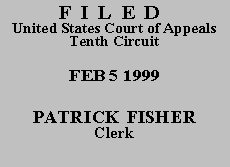

| GLOVER CONSTRUCTION CO.,
INC.,
Plaintiff-Appellant, v. BRUCE BABBITT, Secretary of Department of Interior, |
|
Plaintiff Glover Construction Company brought this action alleging defendant failed to require the Bureau of Indian Affairs to require the Cherokee Nation to abide by the provisions of the Federal Acquisition Regulations (FARS), 48 C.F.R. § 1 et seq. The district court denied Glover Construction's request for injunctive relief and dismissed the action. We dismiss this appeal on mootness grounds, and do not address the more difficult questions of standing and jurisdiction.
On June 15, 1995, the Cherokee Nation of Oklahoma began soliciting bids for construction of "Greasy Road." Four construction companies responded to the bid: Mouache-Capote Construction, Frix Foster Construction, Hub Construction, and Glover Construction. At the bid unsealing, the bid of Hub Construction was rejected as nonresponsive to the solicitation. The bid of Mouache-Capote was the lowest, followed by the bid of Frix Foster Construction, and then Glover Construction. Although the bid of Mouache-Capote failed to include unit prices, its bid did include the number of units and the total price for each specific item. Thus, the unit price was readily ascertainable from the face of the bid. The Cherokee Nation did not reject the bid of Mouache-Capote as nonresponsive under 48 C.F.R. § 14.301, but allowed it to correct its bid. The contract was awarded to Mouache-Capote.
Glover Construction filed this action, contending defendant, through the Bureau of Indian Affairs (BIA), failed to require the Cherokee Nation to adhere to federal procurement standards. The Cherokee Nation was allegedly bound by such regulations after negotiating for their application in accordance with 25 U.S.C. § 458cc(e). Glover Construction sought injunctive relief requiring defendant to direct the BIA to order the Cherokee Nation to set aside the bid of Mouache-Capote Construction as nonresponsive and to rebid the project in accordance with federal standards. In its amended complaint, Glover Construction alleged that during construction of the road the Cherokee Nation had permitted Mouache-Capote Construction to increase the contract price by over $100,000 without requiring bids, which was not in accordance with the contract modification requirements of FARS and 41 U.S.C. § 254b. The district court held the failure to explicitly list unit prices was not a material alteration, but was a correctable "minor irregularity" under the regulations, and that Glover Construction was not entitled to injunctive relief because it had not shown irreparable harm.
The Greasy Road was completed no later than May 20, 1997. Therefore, Glover Construction's claims for injunctive relief to require rebidding for the contract award and for subsequent contract modifications are moot. See Columbian Rope Co. v. West, 142 F.3d 1313, 1316 (D.C. Cir. 1998); Neighborhood Transp. Network, Inc. v. Pena, 42 F.3d 1169, 1171-72 (8th Cir. 1994).
The only remaining issue is Glover Construction's request for an injunction requiring defendant to direct the Cherokee Nation to abide by the regulations during future bidding of projects. In essence, Glover Construction assumes the situation that occurred here will be exactly replicated in the future and asks that an injunction issue now to insure it is protected later.
These circumstances do not present an ongoing case or controversy over which this court may exercise jurisdiction under Article III. See Jones v. Temmer, 57 F.3d 921, 922 (10th Cir. 1995). At best, Glover Construction's argument is construed as one invoking the "capable of repetition, yet evading review" exception to the mootness doctrine. See Fischbach v. New Mexico Activities Ass'n, 38 F.3d 1159, 1161 (10th Cir. 1994). That exception does not save the claim as there is no "reasonable expectation" that Glover Construction will suffer the same injury, see West, 142 F.3d at 1317, and no reason for this court to assume the issue is not capable of meaningful review if Glover Construction is subjected to the same allegedly unlawful treatment in the future, see Pena, 42 F.3d at 1172. See also Jones, 57 F.3d at 923 (rejecting argument that claim is not moot based on possibility that legislature could reinstate law as "too conjectural and speculative to avoid a finding of mootness").
We add that Glover Construction's request for injunctive relief is nothing more than an artfully phrased prayer for the court to require Cherokee Nation to obey the law in the future. Such injunctions are not appropriately issued. See Hughey v. JMS Dev. Corp., 78 F.3d 1523, 1531 (11th Cir. 1996) ("[A]ppellate courts will not countenance injunctions that merely require someone to obey the law.") (internal quotation omitted); Epstein Family Partnership v. Kmart Corp., 13 F.3d 762, 771 (3d Cir. 1994) (recognizing while "an injunction may be framed to bar future violations that are likely to occur, . . . [b]road non-specific language that merely enjoins a party to obey the law or comply with an agreement . . . does not give the restrained party fair notice of what conduct will risk contempt") (internal quotation omitted).
Glover Construction's appeal is DISMISSED as moot.
Entered for the Court
Mary Beck Briscoe
Circuit Judge
*. This order and judgment is not binding precedent, except under the doctrines of law of the case, res judicata, and collateral estoppel. The court generally disfavors the citation of orders and judgments; nevertheless, an order and judgment may be cited under the terms and conditions of 10th Cir. R. 36.3.